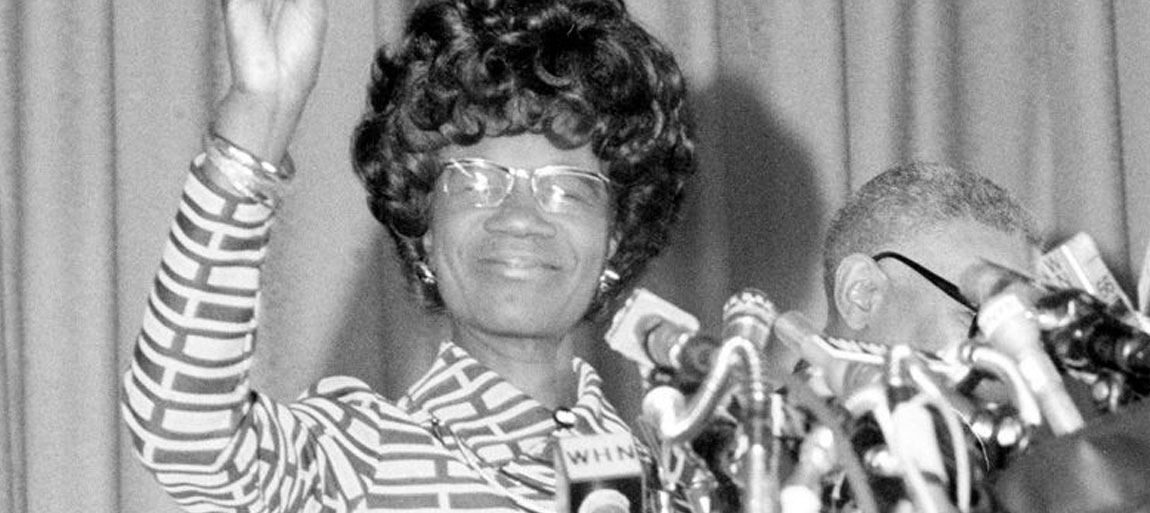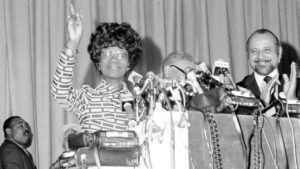
Unbought and Unbossed . . . Shirley Chisholm
Throughout her career, she championed civil rights, women’s rights, and social justice, breaking down barriers and challenging the status quo.



Throughout her career, she championed civil rights, women’s rights, and social justice, breaking down barriers and challenging the status quo.
Shirley Chisholm, the first African American woman elected to the United States Congress and the first African American to run for a major party’s presidential nomination, was a trailblazer whose legacy continues to inspire generations of Americans. Born in Brooklyn, New York, in 1924, Chisholm rose from humble beginnings to become a pioneering figure in American politics. Throughout her career, she championed civil rights, women’s rights, and social justice, breaking down barriers and challenging the status quo. In this article, we delve into the life and accomplishments of Shirley Chisholm.
Shirley Anita St. Hill was born to parents who had immigrated from Barbados and Guyana to Brooklyn, New York on November 30, 1924. She received an education in the public schools of Brooklyn. She knew the struggles of poverty and prejudice from her childhood in a working-class neighborhood. The resilience and self-confidence that Chisholm inherited from her parents came from their own experiences of hardship.
Chisholm was very interested in politics and action, and she did quite well academically. It was in 1946 that she received a BA in sociology from Brooklyn College. She started her teaching profession immediately after graduation, fighting for better working conditions and equitable compensation for Black American teachers. In order to deepen her dedication to educational equity and social justice, Chisholm went on to earn a Master of Arts in primary education from Columbia University.
Shirley Chisholm’s entry into politics occurred in the 1960s, when she was compelled to do so by her strong desire for social change. Representing Brooklyn’s Bedford-Stuyvesant neighborhood in the state legislature, she made history in 1964 as the second African American woman to do so. In her role as a state senator, Chisholm championed the causes of low-income housing, public schools, and healthcare for marginalized populations.
When Chisholm was re-elected to the US Congress in 1968, she became the first African American woman to do so. As the representative representing New York’s 12th congressional district, she became known for her unwavering support of progressive policies and civil rights. Because of her courageous advocacy for underrepresented groups’ concerns and progressive policy goals, Chisholm’s time in Congress was revolutionary. She played a key role in establishing the Congressional Black Caucus and increasing representation of women and people of color in legislative and executive branch positions. Chisholm’s simple presence in Congress opened doors for more diverse leaders to come, motivating them to work for greater government representation and public service careers.
Shirley Chisholm was a legendary congresswoman for her courageous leadership and dogged pursuit of social justice. She used her platform to raise the voices of the oppressed and disadvantaged, and she was an outspoken supporter of women’s rights, economic empowerment, and civil rights.
Education, healthcare, poverty, and housing were just a few of the many causes that Chisholm fought for. She advocated for laws that would increase funding for healthcare, broaden participation in public school systems, and tackle inequality and poverty at their source. A relentless worker for a more fair and equitable society for all Americans, Chisholm’s advocacy was fueled by her belief in the inherent dignity and worth of every individual.
Shirley Chisholm was the first African American woman to run for president in 1972, during a campaign in which she broke new ground by seeking the candidacy of a major political party. Her historic campaign shook up American politics by questioning the current quo and elevating gender, racial, and representational concerns. With the motto “unbought and unbossed,” Chisholm began her campaign, highlighting her autonomy and resolve to advocate for the interests of every American, while encountering significant challenges and opposition from the political elite.
Win or lose, Chisholm’s presidential campaign was about more than simply changing the status quo; it was also about increasing the opportunities for women and people of color in politics. For a generation of activists and leaders, Chisholm was an inspiration because she never wavered from her values and ideals, even in the face of opposition.
Beyond her historic presidential campaign and revolutionary accomplishments, Shirley Chisholm’s political legacy reaches far and wide. A legacy of strength, perseverance, and optimism is hers to leave behind. The strength that comes from overcoming obstacles is demonstrated by Chisholm’s life and work.
Countless Americans have been moved by Chisholm’s story and have vowed to fight for social justice, equality, and the elimination of injustice. As Americans battle for voting rights, fair representation in government, and civil rights, her belief in the significance of political involvement and activism is relevant today.
An Advocate for Equality in Food and Housing
Shirley Chisholm’s strong grasp of the American realities of poverty and hunger informed her advocacy for food stamps. Chisholm seen the hardships endured by low-income families while she was a child living in Brooklyn, New York. Her perspective on the world and her resolve to advocate for measures that would help the hungry and the downtrodden were both molded by these events.
Households with lower incomes and communities of color are more likely to experience food insecurity, which is characterized as having limited or unclear access to sufficient food. A lot of people rely on food stamps, which are formally called the Supplemental Nutrition Assistance Program (SNAP), to make ends meet and buy healthy food. When Chisholm was in Congress, she made it her mission to defend and improve the food stamp program because she knew how important it was in the fight against hunger and malnutrition.


Social justice and equality were the cornerstones of Chisholm’s argument for food stamps. The right to sufficient nutrition, in her view, was a basic human right, and it was the duty of the government to guarantee that every American had a shot at success. In an effort to safeguard the food stamp program from cuts and limits that might negatively impact disadvantaged communities, Chisholm laboriously sought bipartisan agreement for measures to enhance the program.
The contemporary food stamp program was founded by the Food Stamp Act of 1964, which Chisholm supported and was one of her most important contributions to food stamp legislation. This historic law paved the way for a more all-encompassing strategy to combat poverty and hunger in the United States by increasing eligibility for food stamps for low-income households. Inspiring the program’s early stages and guaranteeing its continued relevance to millions of Americans, Chisholm’s effort was vital.
The fight for equality and dignity for all Americans was at the heart of Shirley Chisholm’s crusade for food stamps; it extended beyond simply providing food aid to the needy. Poverty and hunger, she saw, were not just people’s faults but sprang from structural inequalities that afflicted vulnerable populations the worst.
Everyone in the United States, regardless of their color, socioeconomic status, or family history, deserves to be treated with the utmost dignity and respect, and Chisholm thought that everyone should have the right to sufficient sustenance. She battled valiantly to remove obstacles to food access and to solve poverty and hunger by addressing its root causes, which include prejudice, economic injustice, and a lack of educational and occupational opportunities.
Chisholm’s larger goal for a more equal society included fighting for food stamps. For her, ending poverty and hunger meant doing more than handing out food stamps; it meant getting to the bottom of injustice and unfairness and creating a world where everyone could succeed. In their pursuit of solutions to the persistent problems of poverty and hunger in the United States, advocates and lawmakers find inspiration in Chisholm’s steadfast dedication to social justice and equality.
A legacy of revolutionary leadership, courageous advocacy, and everlasting empowerment is Shirley Chisholm’s political legacy. She set the path for subsequent generations of diverse activists and leaders with her historic election to Congress and her groundbreaking presidential campaign. Millions of Americans are still motivated to strive for a more fair society by Chisholm’s dedication to social justice and equality. As we think about her life and work, may we remember her by not giving up the struggle for human rights, equality, and self-determination.

